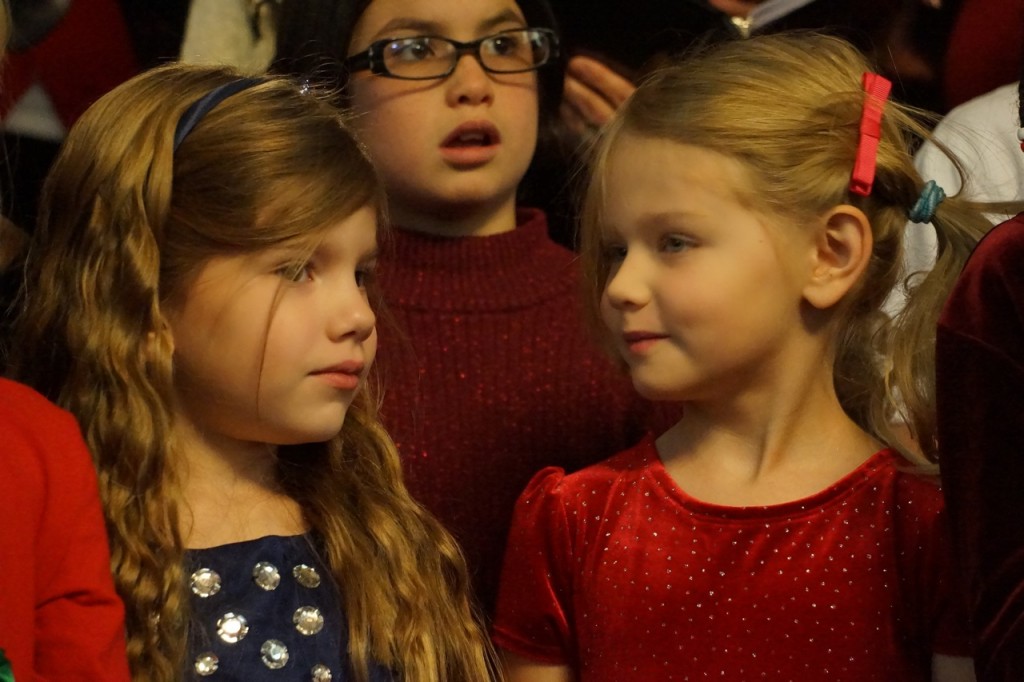So a week ago I attended my daughter’s first community choir event for the Christmas season, at a Lutheran church no less. It was a lovely—even, dare I say, spiritual—event, a crowd of darling children singing (or not) Christmas carols in unison, some of the kindergartners simply standing there smiling (or not), looking forward, occasionally dancing, my daughter standing back-to-back with one of her little friends on cue, looking sassy. Like any proud papa, I was in the first row, recording the event on video with my expensive Sony camera. And on this date in late December 2012, a person can’t help but think about the recent Sandy Hook shooting tragedy, what a senseless heartbreak it is.
As I sat there and watched the kids, I noticed one boy in the second row, a cute kid who wore ripped jeans. The kids were told to wear their Sunday best, so he kind of stood out, being a bit in disrepair. It tweaked my heart strings, guessing that this wasn’t a fashion statement for the boy, but simply a hole in his pants. It brought me back. Sitting there in the Lutheran church, I remembered what it was like, being the outlier in an elementary school play.
In the U.S., we like to think we’re all somehow “middle-class,” unless you’re stinking rich and are proud to identify with that class. But most of my friends throughout life would roughly be identified as middle-class, or, if you happen to be fortunate enough to attend a good university (as I was), usually means, more accurately, “upper middle-class.” In grad school, it seemed that most of my classmates had trust funds, and didn’t really have to work, but some of them did—you know, for a character-building experience.
For most of us, if we are poor, or have been poor, we don’t like to admit it. Why do so many people vote Republican, whose policies obviously favor the moneyed class? Because we all want to be part of that class. In the recent election, my daughter came home from kindergarten one day and to report that one of her friend’s parents said that they didn’t like Obama “because he gives money to poor people.” I would imagine that quote was mangled a bit from parent to daughter to my daughter, but this is a rural, Republican-leaning county in southern Colorado, and I assume the sentiment was accurate: The idea that Obama’s policies are too heavy on “entitlement” programs, such as Social Security (into which I’ve paid all my life, and know full well I’ll never recover all the money I’ve paid in, which I accept as part of the social contract of helping others). My wife and I answered my daughter that helping out others, and especially poor people, was a good thing. And I told her that I was in fact a poor kid when I was young, and knew how it felt to be one.
So as tactless news reporters often ask at the scene of a tragedy, “How did that make you feel?” Well, I can admit to many fond memories from my impoverished childhood, and a few painful ones. I was the youngest of nine kids, a good Catholic family, with a single mother—my father committed suicide when I was three, my mother remarried a louse, then divorced him. She worked as a book keeper at a hospital in San Antonio, Texas, and we got by. Christmas was a glorious affair, and I don’t remember ever being short-changed under the Christmas tree, though I’m sure others had much more lavish bounties.
I noticed our relative poverty as I got older in grade school—say, in fifth and sixth grades, especially. I happened to live in a school district near a wealthy enclave called Shavano Park, whose home-owners would definitely be described by the term “upper middle-class,” or higher. Most of my friends had swimming pools in their back yards. I wanted one. Most of my friends got an incredible array of Christmas gifts: I wanted all that stuff. But what I found most humiliating in all my poor-kid experience was not something that I did or did not get for Christmas, but something I had to give: a little American flag.
It was one of those share-the-gift days late in the season, at the class Christmas party before the holidays. We were all supposed to bring a simple gift. My mother did the shopping, and bought a smallish American flag, the flimsy red-white-and-blue pattern on cloth stapled on a simple wooden spool. I didn’t think much of it, and guessed that no one else in my class would, either. What could you do with such a thing? Be patriotic? As if grade-schoolers get a big kick out of flag-waving? (Maybe some do. Maybe I was just an anti-flag child zealot.) I didn’t know the recipient of my gift until the day of the gift-trade party, because we’d already been informed we should each bring a gift, then we would draw names from a hat. I don’t remember what gift I received from that swap, nor do I remember to whom I gave the pathetic little flag. But I remember how ashamed I was for not having more to give than that, for having one of the crummiest gifts in the classroom.
Now I certainly understand the standard conservative blather about people needing to work hard to get ahead in life (which I generally agree with), expressed rather intelligently (if statistically) by Charles Murray’s recent conservative-cultural-analysis, Coming Apart (2012). Yes, I agree that we make decisions that affect whether we will be financially secure—a term that usually means fairly wealthy, say, a Volvo owner—or not. (I chose Volvos as the example because I like them, and not something smacking of rich vulgarity, like a Hummer.) But when you’re a kid, you haven’t made any of those decisions that affect how much money you have to spend on something as minor as a gift for a grade-school classmate. And sure, as much as I love my mother, I can admit that she probably made many decisions that affected that financial status, though some of them were a matter of love and compassion, rather than cold-hearted eye on the bottom-line. (She had six children of her own, and raised three children—two boys and one girl, my stepbrothers and stepsister—from her second marriage.)
Although I won’t cast my own life in some corny Horatio Alger mode, I’ll acknowledge that it’s much different than my childhood. I’m ensconced in what I’d describe as at least comfortable middle-class financial security (a Subaru owner, though I would like a Volvo), although I’m aware that some others would consider it above that category. My six-year-old daughter will never be the Poor Kid (I certainly hope not, at least), and won’t have to deal with that onus and discount-store cross to bear. But I’ll try to instill in her a sense of what’s like to be that kid with the hole in his pants, with the crummy flag to give, the kid who has less. Me? I’m glad for the result of the recent election. I’m glad the businessman who claimed that forty-seven percent of the country just want the government to give them things lost. I’m glad the guy who gets characterized as “giving money to poor people” won. It’s the season of giving, right? In the aftermath of Sandy Hook, we’re all holding our children a little more closely, and we need to hold the disadvantaged closer still.
Here’s a picture of that choir event, all those kids singing—my daughter, Lili, is on the right, standing next to her friend, Kenna Ingram:

- October 2023
- September 2023
- September 2021
- April 2020
- September 2019
- May 2019
- August 2018
- February 2018
- January 2018
- October 2017
- August 2017
- June 2017
- May 2017
- March 2017
- February 2017
- November 2016
- October 2016
- May 2016
- April 2016
- March 2016
- February 2016
- January 2016
- November 2015
- October 2015
- September 2015
- June 2015
- May 2015
- April 2015
- March 2015
- December 2014
- September 2014
- August 2014
- May 2014
- March 2014
- February 2014
- January 2014
- December 2013
- November 2013
- October 2013
- September 2013
- August 2013
- July 2013
- June 2013
- May 2013
- April 2013
- March 2013
- February 2013
- January 2013
- December 2012
- November 2012
- October 2012
- September 2012
- August 2012
- July 2012
- June 2012
- May 2012
- April 2012
- March 2012
- February 2012
- January 2012
- December 2011
- November 2011
- October 2011
- September 2011
- August 2011
- July 2011
- June 2011
- May 2011
- April 2011
- March 2011
- February 2011
- January 2011
- December 2010
- November 2010
- October 2010
- September 2010
- August 2010
- July 2010
- June 2010
- May 2010
- April 2010
- March 2010
- February 2010
- January 2010
- December 2009
- November 2009
- October 2009
- September 2009
- August 2009
- July 2009
- June 2009
- May 2009
- April 2009
- March 2009
Recent Posts
- Aliens Among Us: Probing Hillbillies and Freaking Shut-ins, How Netflix’s “Encounters” and Hulu’s “No One Will Save You” Prep Us for the Coming Alien Apocalypse, Kind of
- My Life as a Bob Odenkirk Character: On How Watching Netflix’s Black Mirror episode “Joan Is Awful” Mimicked My Experience of Watching the AMC series Lucky Hank
- “Bobcats, Bobcats, Bobcats”: Animal Life and a Tribute to “Modern Family”
- “The North Water”: This Ain’t Your Daddy’s Moby Dick
- Day 25: On David Quammen's "Spillover": Terrific Book That Foretold Our Pandemic, Kind of
Recent Comments
No comments to show.
